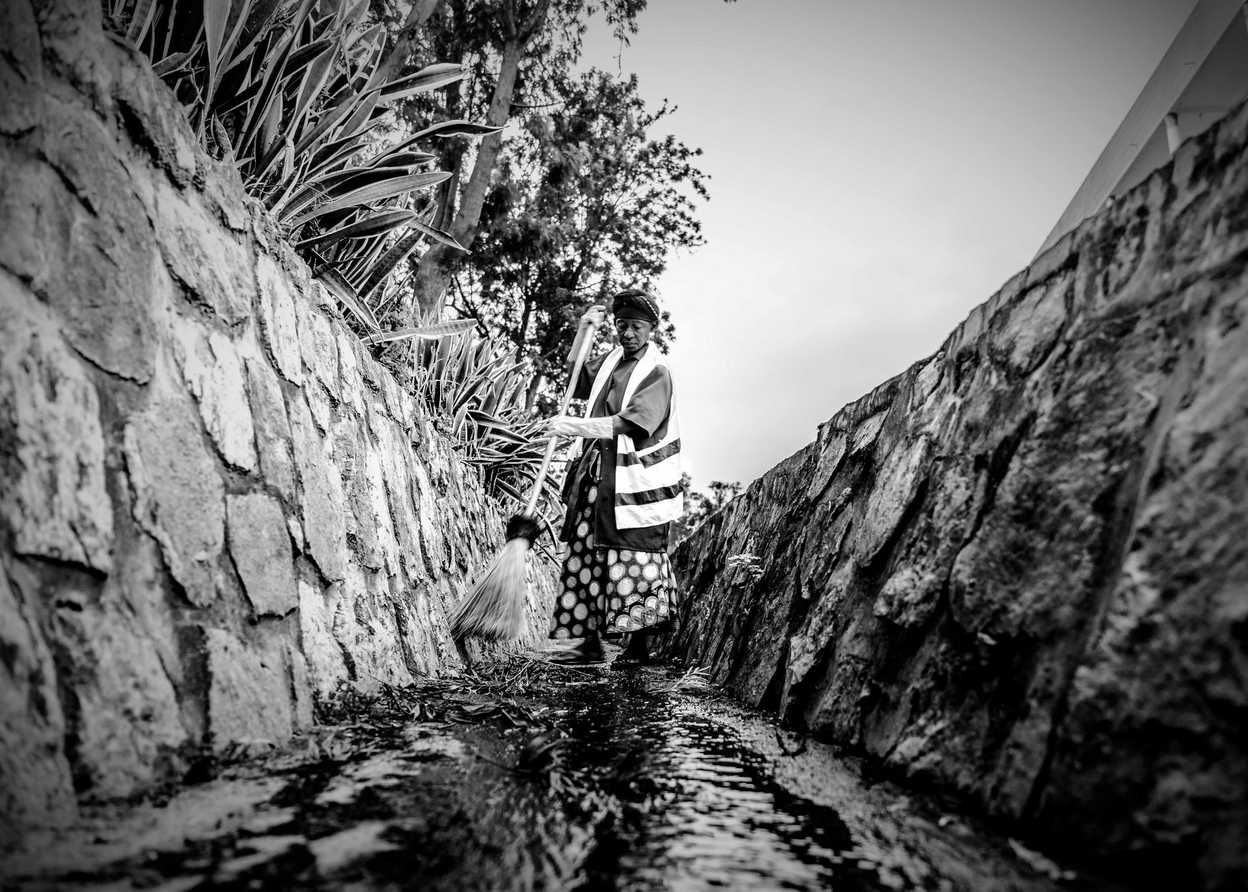The first thing I noticed about Kigali when I moved to Rwanda is how impeccably clean it is. Citizens enjoy an unblemished urban environment, which they maintain through collective actions of duty such as Umuganda — the last Saturday of every month when neighbors come together to paint, build, sweep, and garden. But on a day-to-day basis, who are the reliable forces behind the city’s speckless lawns and polished pavements?

Through his black and white photography compilation Bonds & Brooms, photographer and videographer Eric Murinzi is documenting the faces and the stories of the individuals who make Rwanda the cleanest country in Africa.
“We are 26 years after the genocide, and keeping a clean country up is one of our major achievements. It breaks my heart to see that the cleaners — women in their majority — aren’t getting enough recognition. I want to record these people in history,” Eric says.
Eric Murinzi is 28 years old and lives with his adopted dog, Ginger, in Kigali, near Remera, where he also grew up. Eleven years ago, photography emerged as a coping mechanism to tolerate and confront his mother’s death. In 2013, after graduating from high school, Eric decided to follow his calling rather than enroll in university with a loan he would struggle to pay back. He started spending time with a photographer friend who immersed him in wedding photography. Ten months into it, Eric felt the need to evolve through the diversity of his work and moved into freelance photography. He accepted commissions from the UNDP, the British anti-genocide NGO Aegis Trust, and the Voice of America. In 2019, Eric dedicated his time entirely to his personal project Bonds & Brooms to showcase the identities of the women and men who confiscate every scrap of litter in Kigali.

Bonds & Brooms chronicles 67 cleaning women and three men in Kigali, Musanze, Rubavo, and Kibuye during 2019. Eric says: “That year, I was battling depression, and my creativity was at an all-time low. I didn’t want to leave my house.” Yet, desperate for inspiration and change, he began to roam the streets of his neighborhood with his camera. “I had no idea what my purpose was until I spotted a woman sweeping the street. Of course, I knew these women existed, but I had never looked at them closely. Until that day.” This is how Bonds & Brooms came into existence. For one year, with his camera, an audio recorder, attentive, open-minded listening, and the eagerness to be vulnerable, Eric logged “stories of resilience, perseverance, bravery, and determination.”
“But how easy or difficult it was to approach the women?” I ask Eric. “At the beginning, they were reluctant. They were suspicious that I would make a huge profit from their pictures. I told them sincerely that they would get 10% of each picture that was sold. Most importantly, though, I was ready to open up and share as much about my story as they were about theirs. After a week, they started talking to each other about me, and the feedback they exchanged was positive. One thing I learned from this project is that one ‘no,’ doesn’t mean ‘never’.”

Last January, despite physical tiredness, transportation challenges, and family engagements, some women managed to attend the opening of the Bonds & Brooms exhibition in the Kigali Center for Photography. Eric recollects: “Some cried in front of their pictures, and others were awed by the presence of unknown people, foreigners, and a government representative. These women’s workdays begin at 5.30 in the morning and end at 5.30 in the evening. By the time they arrive home it is dark. They don’t have a social life, so it was overwhelming for them to be surrounded by strangers who applauded them.”

Eric’s photography is about emotions.
“My storytelling has three players,” he says, and continues, “me, the subject portrayed, and the person who looks at the final product. I don’t like talking too much about my photographs because I don’t want to influence the way people see or feel about my pictures. Hence, the black and white. I believe that the best way to tell the story of a person is to block the other colors and the details they underscore.”
Through this work, Eric established new friendships, which unintentionally helped him regain hope. Now, he has a responsibility towards his subjects and Rwanda, to grow and continue the celebration of the people behind one of Rwanda’s extraordinary success stories. Indeed, a year later, since the introduction of Bonds & Brooms to the public, Eric is looking forward to presenting his second black and white photo exhibition called Umutakwasuku at the Kigali Public Library. This time, Eric documents the human impact of sanitation at a time that it is crucial for populations globally.

Details for the Umutakwasuku exhibition:
Where: Kigali Public Library - KN8 Avenue, Kacyiru
When: January 30th to February 8th, 2021
Entrance: Free
Due to increase in Covid-19 cases in Rwanda, the Umutakwasuku Photo Exhibition which was scheduled for 29 January has to be postponed until further notice.
